12 Highest-Paying Software Engineering Jobs [2023 Guide]
![12 Highest-Paying Software Engineering Jobs [2023 Guide]](jpg/12-highest-paying-software-engineering-jobs-2023-guide-800x534.jpg)
In this article
- Is It Easy To Land A High-Paying Software Engineering Job?
- 12 Highest-Paying Software Engineering Jobs
- Skills Needed To Land a High-Paying Software Engineering Role
- Factors That Determine Your Salary in Software Engineering
- Tips To Land a High-Paying Software Engineering Job
- FAQs About Landing a High-Paying Software Engineering Job
Software engineers are some of the most highly sought-after tech workers, and tech companies are willing to shell out the big bucks for reliable engineers.
But if you’re interested in becoming a software engineer, then you should know this—software engineering actually encompasses a wide range of roles, and not all of those roles offer the same pay.
That’s why we’ve created this guide. Below, we’ll tell you all about the 12 highest-paying software engineering jobs, and what they each make so that you can pick the role that best fits you.
Is It Easy To Land A High-Paying Software Engineering Job?
Yes, it is easy to land a high-paying software engineering job, but only if you have the right qualifications. If you don’t have a college degree in a related field, then you should definitely consider a software engineering bootcamp. Look for high-impact and high-visibility roles that require highly sought skills. Usually, these jobs are the best paying.
12 Highest-Paying Software Engineering Jobs

Here are the 12 highest-paying software engineering jobs:
Full-Stack Engineer
A full-stack engineer can design and deploy both the back-end and front-end of an application. They often work with full-stack developers and are responsible for ensuring cross-platform optimization.
What You’ll Do
As a full-stack engineer, you’ll do the following:
- Build scalable solutions that focus on user experience and advanced application performance
- Define models for SQL and noSQL databases
- Implement high-quality AI and secure APIs using HTML/CSS
- Draft technical documentation and proposals for software designs that meet business goals
Average Salary
Full-stack engineers earn in the following range:

General Requirements for This Role
Full-stack engineers are expected to have:
- A bachelor’s degree in software engineering, computer science, or a related field (or equivalent experience through bootcamps and courses)
- A high-level proficiency in JSON, CSS, JavaScript, and HTML
- Experience with database design and SQL
NLP and Machine Learning Engineer
NLP (natural language processing) and Machine Learning Engineers operate at the intersection of software engineering and machine learning. NLP is the practice of teaching a computer how to understand spoken and written text.
What You’ll Do
As an NLP and machine learning engineer, you will:
- Develop and troubleshoot software for various applications and networks
- Collaborate on data science solutions
- Create machine learning models
- Run machine learning tests based on new data sources, formats, and data dictionaries
Average Salary
Salaries for NLP and machine learning engineers vary by location:
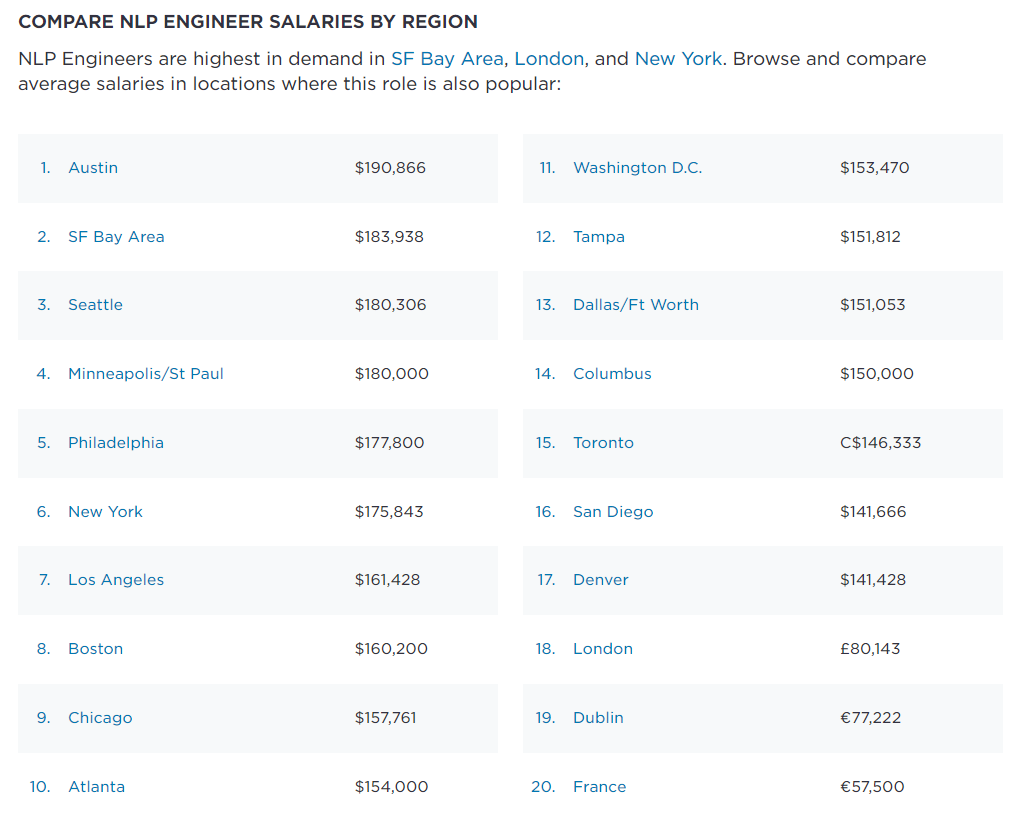
General Requirements for This Role
You’ll need the following for this role:
- A master’s or Ph.D. degree in computer science, applied mathematics, or statistics (you can complete this requirement through courses and bootcamps as well)
- High-level knowledge of NLP tools, deep learning, statistic modeling, and visualization stacks
- Python expertise
DevOps Engineer
DevOps engineers oversee product and code releases, in addition to overseeing an organization’s IT infrastructure. They often work in collaboration with software developers and system operators.
What You’ll Do
DevOps engineers are involved in:
- Developing software tools that improve flexibility, scalability, and accessibility
- Identifying opportunities for automation
- Assisting the application development team with prototype testing
- Managing the migration of systems across various architectures and platforms
Average Salary
Here’s what you can expect to earn as a DevOps engineer:
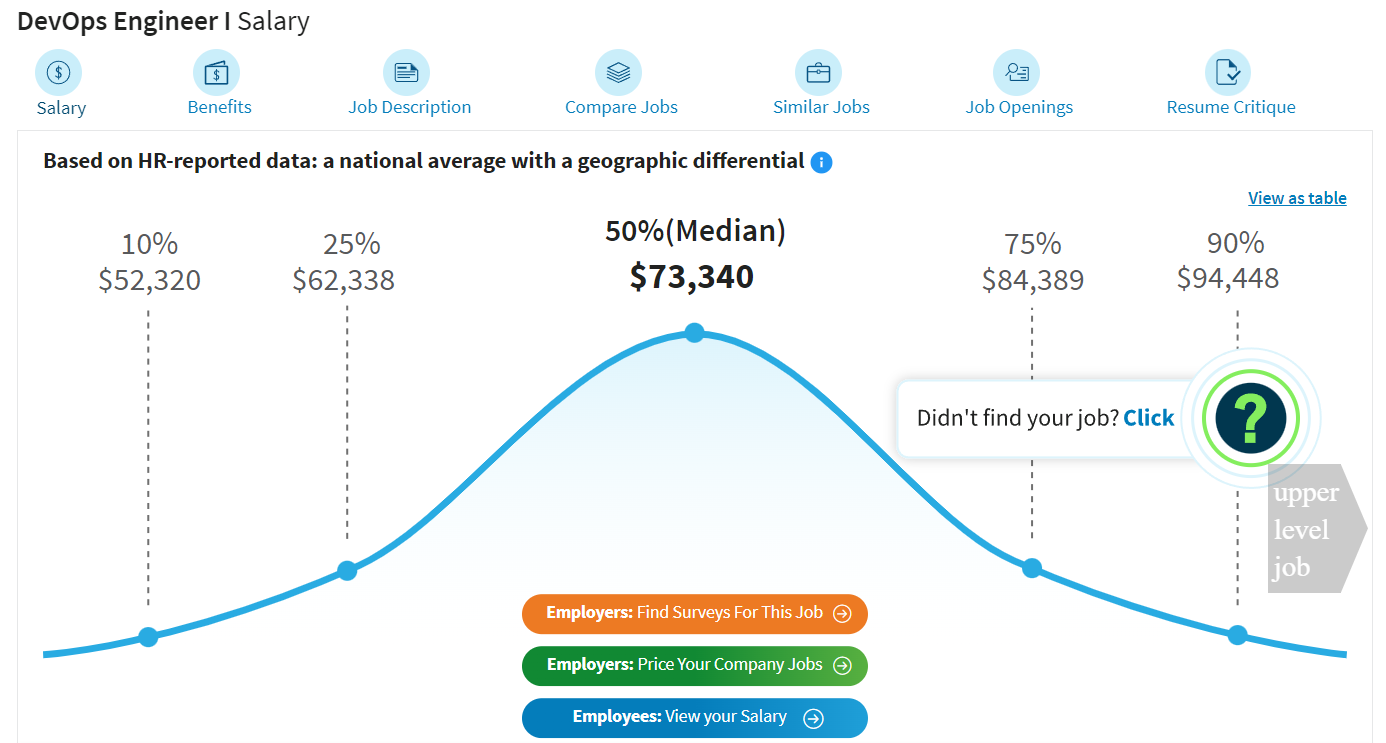
General Requirements for This Role
DevOps engineers must have:
- A bachelor’s degree in software engineering or computer science. Or, they need to have equivalent experience through bootcamps and courses.
- Proficiency with 1-2 programming languages, such as Python or Ruby on Rails
- Working knowledge of data structures, product development concepts, scripting, and API development
Big Data Engineer
Big data engineers build and maintain data processing systems for large databases consisting of structured and unstructured data. Since the volume of data they work with is vast, they have to execute various technical processes to transform the data into actionable insights.
What You’ll Do
A big data engineer is responsible for:
- Resolving data pain points and maintaining data integrity across platforms
- Performing data validation to formulate scalable data solutions
- Executing machine learning algorithms to develop data pipelines
- Cleaning and generating insights from structured, semi-structured, and unstructured data sources. These can be a combination of spreadsheets, JSON files, log files, video/audio files, texts, and images
Average Salary
A big data engineer’s annual salary falls in the range of:

General Requirements for This Role
Big data engineers should have the following to succeed in their role:
- A bachelor’s degree in computer science, economics, or a related field (or equivalent educational experience through courses and bootcamps)
- Advanced proficiency in Python/Java/Spark, SQL, and resource management frameworks like Yarn or Meso
- A working understanding of:
- Data structures, data interdependencies, and data tables
- Abstraction tools (such as Kubernetes)
- Open-source tools such as Beam and Kafka
Back-End Engineer
A back-end engineer deals with all the “behind-the-scenes” aspects of a digital application. This could be a software app’s skeleton or a website’s server. A user will not be able to “see” the work of a back-end engineer.
What You’ll Do
A back-end engineer performs the following tasks:
- Write scalable code and participate in code reviews
- Build application features
- Develop APIs, portals, tutorials, and SDKs
- Monitor and solve bootle techniques using data modeling and query optimization
Average Salary
A backend engineer earns in the range of:

General Requirements for This Role
Backend engineers should have:
- A bachelor’s degree in software engineering, computer science, or related fields. Or, they should have completed a bootcamp.
- Advanced knowledge of programming languages like Python
- Experience with relational databases and caching systems
AR/VR Engineers
AR/VR engineers build augmented reality and virtual reality products. They combine software design, programming skills, and AR/VR-specific knowledge to create interactive experiences for users.
What You’ll Do
AR/VR engineers perform the following tasks:
- Designing AR and VR prototypes and systems
- Developing the backend and extracting data from platforms and sensors for XR environments
- Working with designers and project managers to formulate product ideas/solutions
- Perform code reviews and create documentation
Average Salary
Here’s what you can expect to earn:
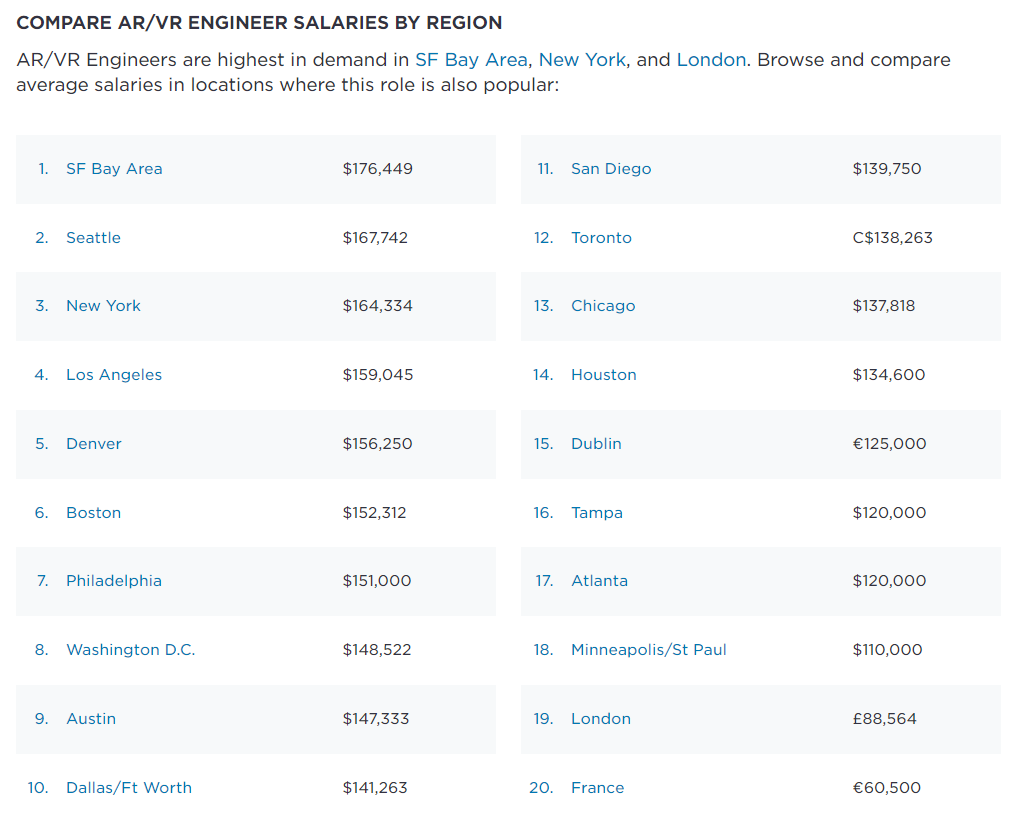
General Requirements for This Role
An AR/VR engineer requires:
- A B.S. in computer science or equivalent experience through bootcamps and courses
- Proficiency in C++, Python, or another programming language
- Experience with 3D Graphics API and project management systems
Software Architect
Software architects plan and design the software system of an organization. They are responsible for ensuring that the different components of the software work with each other.
What You’ll Do
As a software architect, you will do the following:
- Conduct design analysis on different components of a piece of software
- Perform architectural reviews
- Create technical design guides with project-specific design principles
- Evaluate potential software solutions
Average Salary
Software architects’ annual salaries fall in these ranges:
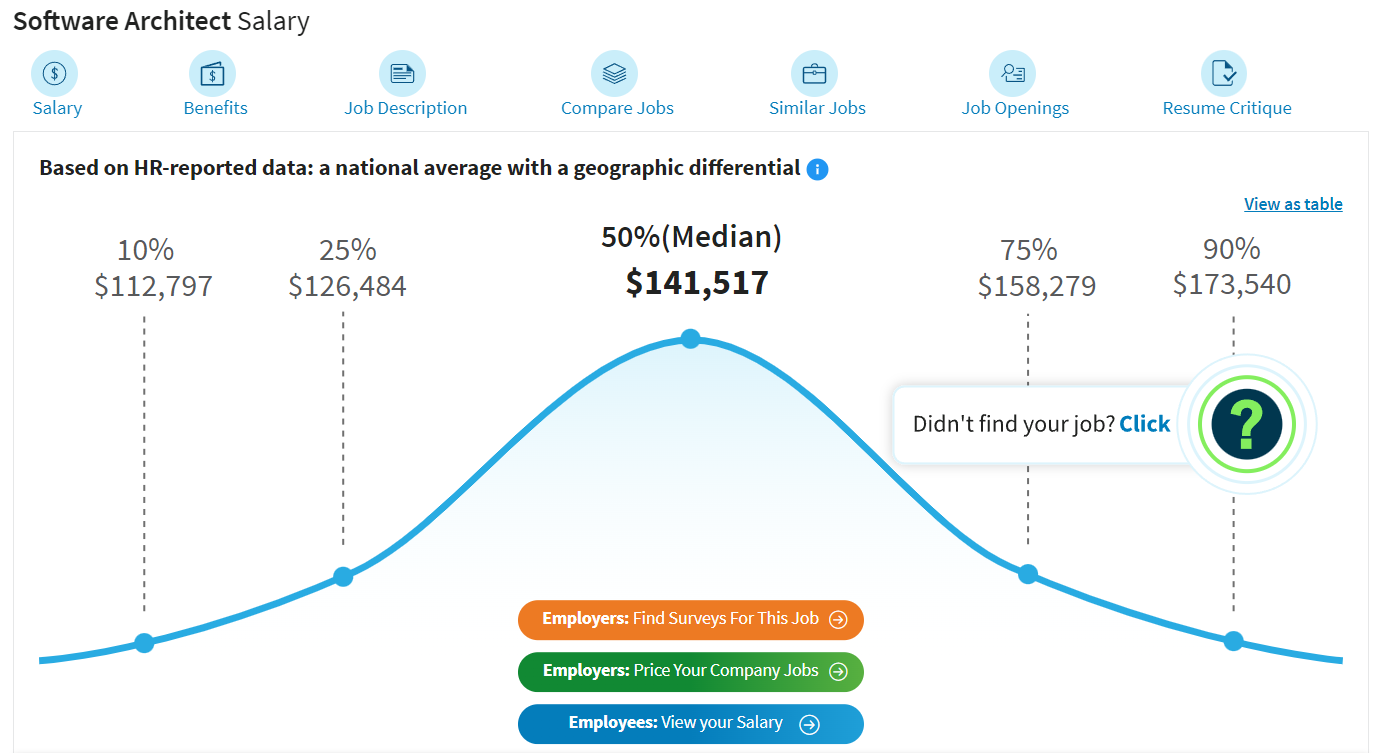
General Requirements for This Role
A software architect is expected to have:
- A bachelor’s degree or doctorate in computer science, electrical engineering, applied science, or mathematics (or equivalent experience with bootcamps and courses)
- Competent coding knowledge to formulate proofs of concepts and prototypes
- Working knowledge of cloud technologies
Cybersecurity Engineer
Cybersecurity engineers guard an organization’s systems and networks by creating systems that prevent or mitigate cybersecurity attacks. Other cybersecurity experts, such as penetration testers and cybersecurity analysts, work within the systems created by the cybersecurity engineer.
What You’ll Do
Cybersecurity engineers do the following:
- Develop secure network solutions
- Audit security technology systems
- Assist in the performing and review of penetration tests and vulnerability assessments
- Develop organizational-level cybersecurity strategy in coordination with information security managers
Average Salary
Cybersecurity engineers earn in the following salary range:
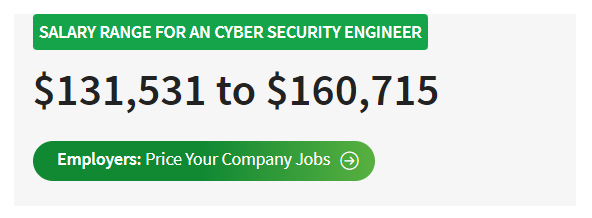
General Requirements for This Role
Cybersecurity engineers must show the following qualifications:
- Bachelor’s degree in software engineering, computer science, IT, or related fields. Or, you can complete a cybersecurity bootcamp.
- Experience with 1-2 programming languages such as C++, Java, Python, or Ruby
- Prior experience working in incident response or forensics
Embedded Systems Engineer
Embedded systems are pieces of hardware that have software embedded in them. For an organization, embedded systems could include all the sensors on their manufacturing floor or the robot arms that automate defect control. An embedded systems engineer designs and deploys these systems.
What You’ll Do
Embedded systems engineers are responsible for the following:
- Designing digital circuitry for microcontrollers/sensors
- Evaluating improvements in manufacturing processes, costs, and scalability based on embedded systems
- Testing connectivity features across products
- Interfacing with other engineering teams responsible for hardware design and development
Average Salary
Here’s what you can expect to make as an embedded systems engineer:
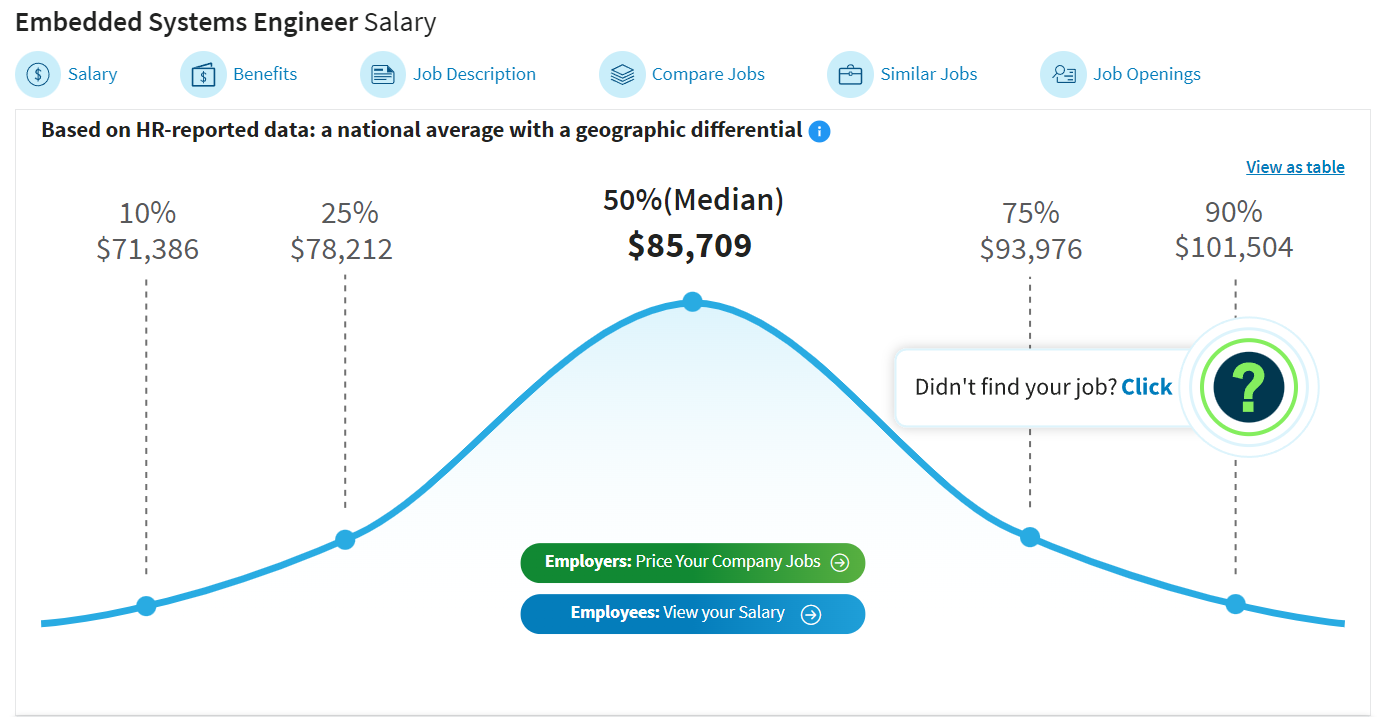
General Requirements for This Role
Embedded systems engineers need the following to apply for this role:
- B.S. degree in computer engineering, electrical engineering, computer science, or related fields. Or, a bootcamp that offers a comparable education.
- Expert-level understanding of at least 2 programming languages
- Working knowledge of networking concepts like the ethernet and technology related to embedded systems
Site Reliability Engineer
Site reliability engineers (SREs) contribute to the software development process by increasing a site’s reliability. They implement software that helps make an organization’s systems, processes, and technology more resilient.
What You’ll Do
SREs will be responsible for:
- Building software and architecture that helps ITOps and DevOps teams with software delivery
- Addressing support escalation issues/critical incidents and conducting post-incident reviews accordingly to document findings
- Automating site infrastructure and monitoring the efficacy of these automated sites
- Managing the release of production changes
Average Salary
Here’s what you can expect to make as an SRE:
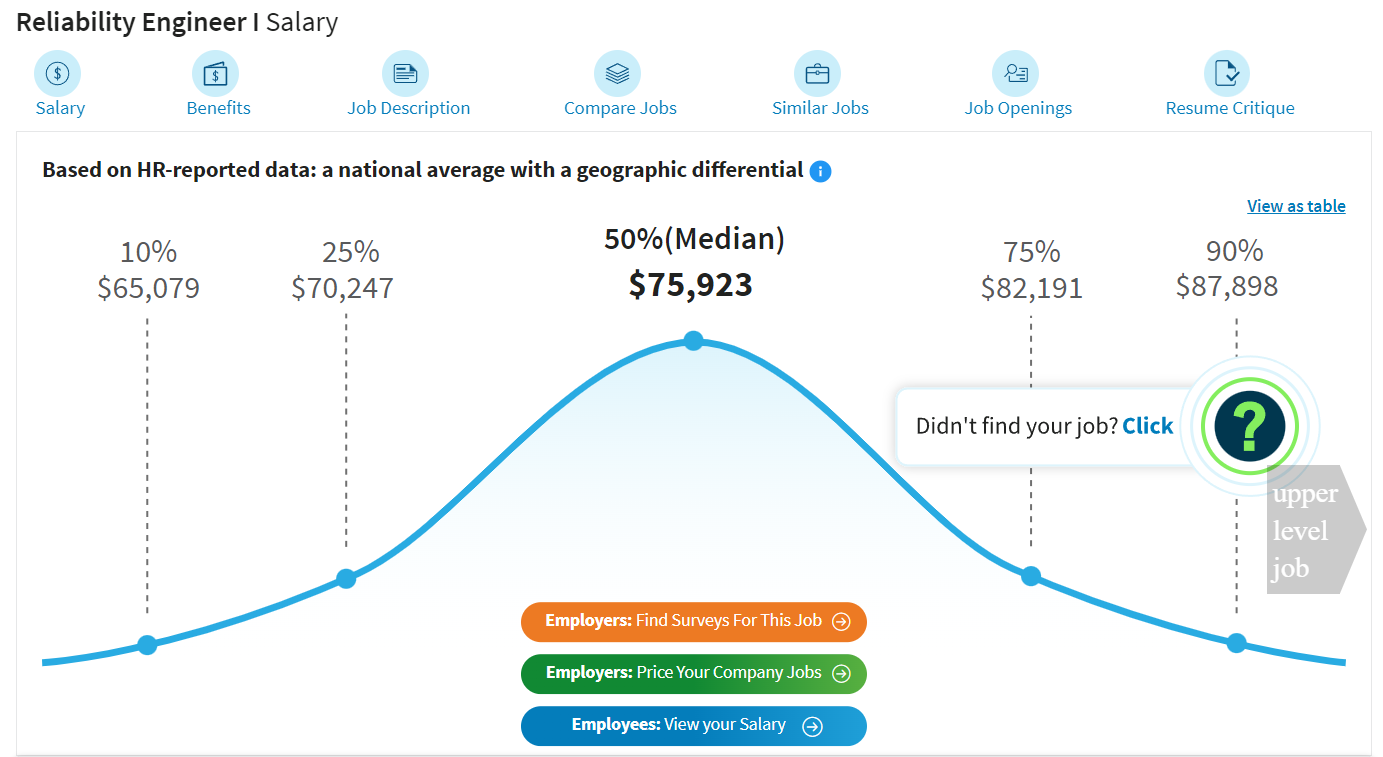
General Requirements for This Role
For the SRE role, these are the requirements you need to have:
- Bachelor’s degree or sufficient background in any software engineering field
- Working knowledge of software development cycles, site operations, and production monitoring systems
- Coding skills (Java, Python, Ruby, etc.)
Game Developer
Game developers design video game software for PCs, laptops, and gaming consoles. They contribute to all the stages of video game production, including executing (and/or creating) game storylines, audio/graphic design, and game specs.
What You’ll Do
Game developers are responsible for:
- Translating game-related ideas into code
- Constructing the game base engine, environment, and other game specifications
- Creating high-quality VR experiences based on provided scripts and character biographies
- Fixing bugs
Average Salary
Game developers earn an average yearly salary of:
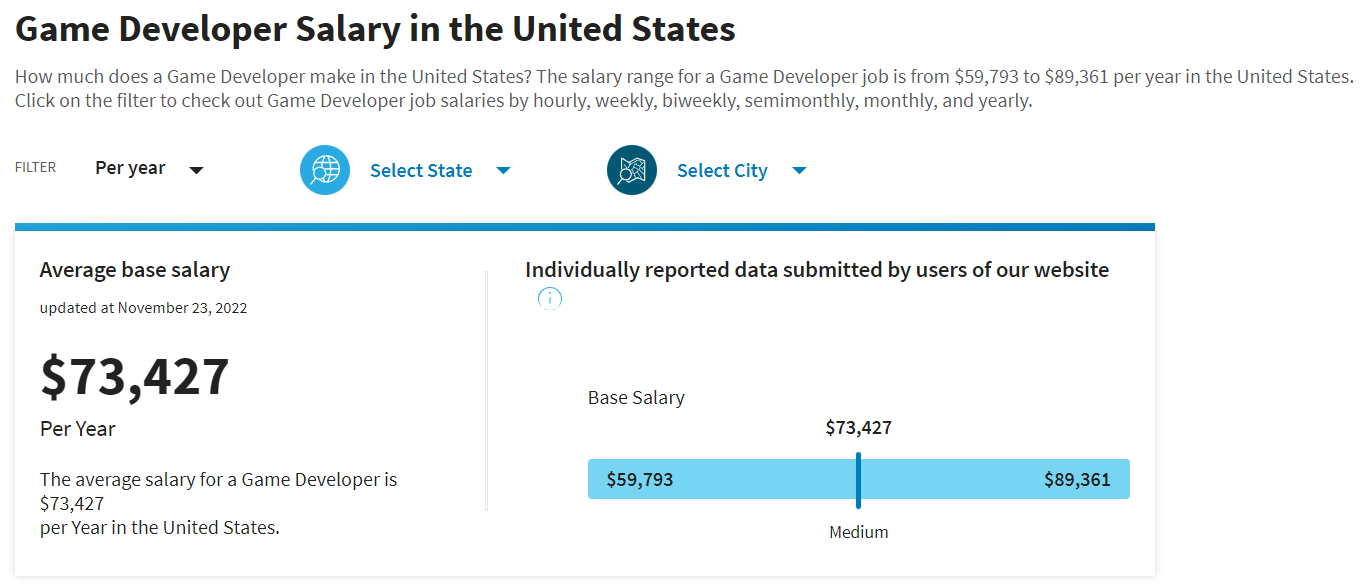
General Requirements for This Role
You are likely to get hired as a game developer if you meet the following requirements:
- Bachelor’s degree (or equivalent experience) in computer science or software engineering. Or, if you have a comparable education through a bootcamp.
- Proficiency in C++ or Java and graphic design
- Working knowledge of APIs and the latest gaming trends and technologies
Software Engineering Manager
Software engineering managers guide software engineering teams during a software product’s lifecycle, ensuring the coordination and completion of projects.
What You’ll Do
As a software engineering manager, you will:
- Mentor teams of engineers and provide them with technical/soft support to ensure timely fulfillment of milestones
- Advise internal stakeholders on the feasibility of product proposals
- Formulate roadmaps and KPIs to measure the performance of software teams
- Create an environment of collaboration and cooperation that respects diversity
Average Salary
Here’s what you can expect to make as a software engineering manager:
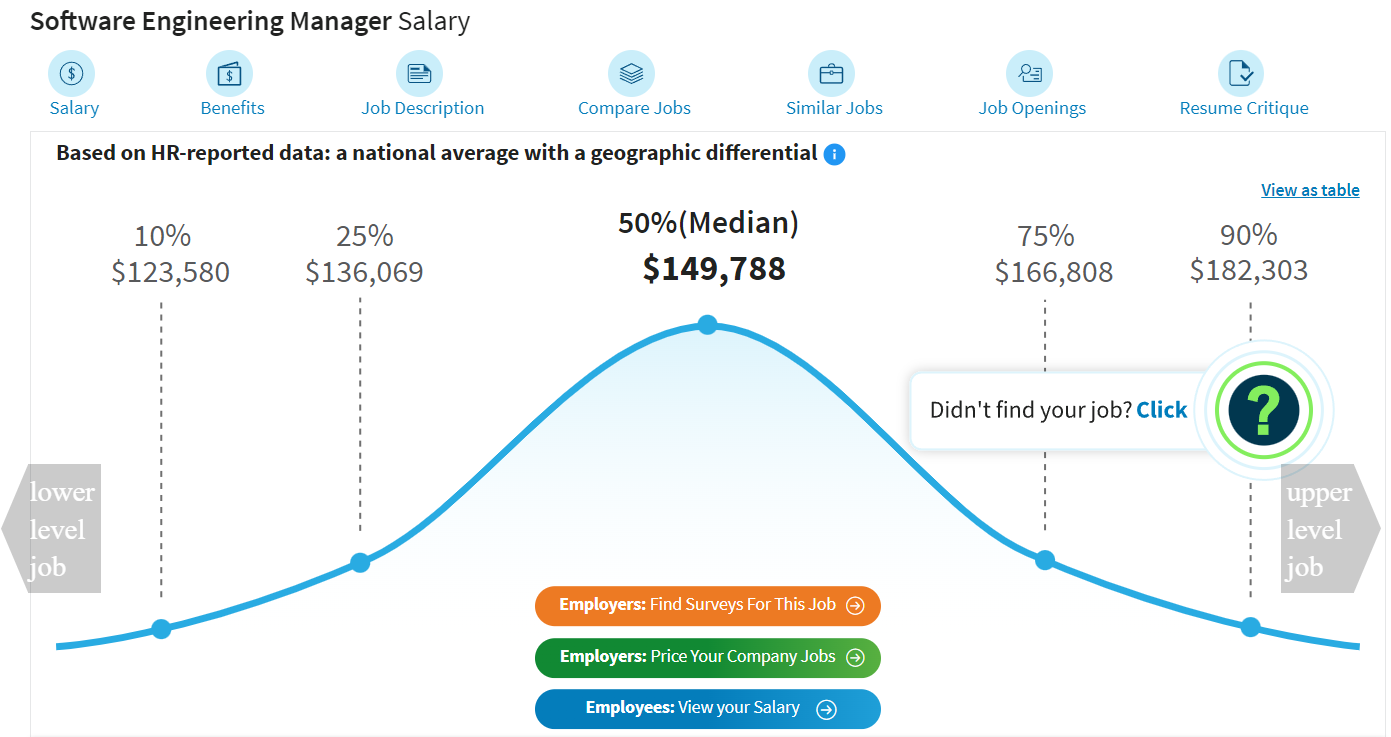
General Requirements for This Role
Software engineering managers must fulfill the following requirements:
- Prior experience working as a software engineer to build and deploy scalable software
- Proficiency in engineering system technologies
- Strong communication and collaboration skills
Skills Needed To Land a High-Paying Software Engineering Role
You need a mix of the following technical and soft skills to land a high-paying software engineering role:
Technical Skills
- Business storytelling. You should be able to present your work and findings to non-technical stakeholders. Especially if you’re working with data, constructing a narrative is essential to getting your point across.
- Object-oriented programming. When you’re coding, you should also be thinking about the end goal.
- Debugging problems. Whether it’s your bug or someone else’s, you should be able to fix it.
Soft Skills
- Communication. Software development requires communication between teams. So you need to be able to communicate effectively, especially with stakeholders whose roles differ from your own.
- Be proactive. Software development cycles can be long and arduous. Reviews can take even longer if no one is going through the process with the sole perspective of anticipating issues at each stage. Be that person who is proactive about issue-spotting. This will improve your technical skills and make you indisposable to any organization.
Factors That Determine Your Salary in Software Engineering

Here are the 4 main factors that determine your software engineering salary:
Specialization
Specialists tend to command higher salaries than generalists. Whether it’s mobile application development, cloud architecture, or gameplay engineering, there’s less competition and more money to be made.
Experience Level
As with virtually every other industry, your experience largely determines how much money you make. But unlike other industries, there are a plethora of different ways to gain experience as a software engineer. Always be upskilling, whether it’s with certifications, courses, or conferences.
Geographical Location
Where you work will often dictate how much you’ll get paid. However, the cities that tend to offer the highest salaries also tend to have the highest cost of living. So make sure to take that into consideration.
Company Sector
Sectors like health, communications, retail, and technology tend to have higher salaries for software engineering roles. If you can find a lucrative sector that also aligns with your own interests, then you’re golden.
Get To Know Other Software Engineering Students
Jack Mayer
Software Engineer at Whitepages
Geraldo Gomes
Software Engineer at Affirm
Dave McConeghy
Software Engineering Career Track Student at Springboard
Tips To Land a High-Paying Software Engineering Job
These 6 tips will put you on the track to landing a high-paying software engineering job:
Choose a High-Paying and In-Demand Specialization
Specializing is a great way to increase your value. But specializing doesn’t have to be a chore. Pick a specialization that fits your own interests—you’ll be rewarded for your work financially, and you’ll enjoy your work all the more.
Negotiate Your Job Offer
Ask for what you think you deserve and come up with evidence to support that. Look at comparable salaries for similar roles at other organizations, and be prepared to make your case.
Upskill
Certain aspects of software engineering require constant learning and upskilling. You can upskill through software programs, bootcamps, and industry events.
Pursue Certifications
Certifications validate your knowledge in a particular field. Show hiring managers that you have pursued a course/self-studied for an exam to indicate your understanding of a subject (outside of regular educational qualifications).
Set a Career Track
Consider your career goals. This can be working for a particular company, or working in a particular industry. Then, see how others have gotten there.
Your Network Is Your Net Worth
Networking is a great way to land a higher-paying job. Keep your ear to the ground for new opportunities, and you’ll eventually be rewarded.
FAQs About Landing a High-Paying Software Engineering Job
We’ve got the answers to your most frequently asked questions:
Which Field of Software Engineering Is Most in Demand?
Full-stack developers and full-stack engineers are always in demand, given that they’re indispensable to almost any tech company.
What Type of Software Engineers Gets Paid the Most?
Cybersecurity engineers and machine learning engineers get paid the most. This is largely because of the growth of AI and increased concerns about data privacy
What Are the Top-Paying Software Engineering Companies?
Some of the best-paying companies include Netflix, Amazon, PayPal, Google, Facebook, and Apple. However, your pay depends on many factors, such as location, exact job role, cover letter and resume, and years of experience
Since you’re here…
No one wakes up knowing how to code – they learn how to code. Tens of thousands of students have successfully learned with our courses, like our Software Engineering Bootcamp. If you’re a total newbie, our Software Engineering Career Track Prep Course will be a perfect fit. Let’s do this!



![What Does a Coder Do? [2022 Career Guide]](jpg/what-does-a-coder-do-2022-career-guide-1-380x235.jpg)
![How To Become a Coder from Scratch [10 Step Career Guide]](png/how-to-become-a-coder-from-scratch-10-step-career-guide-380x235.png)
